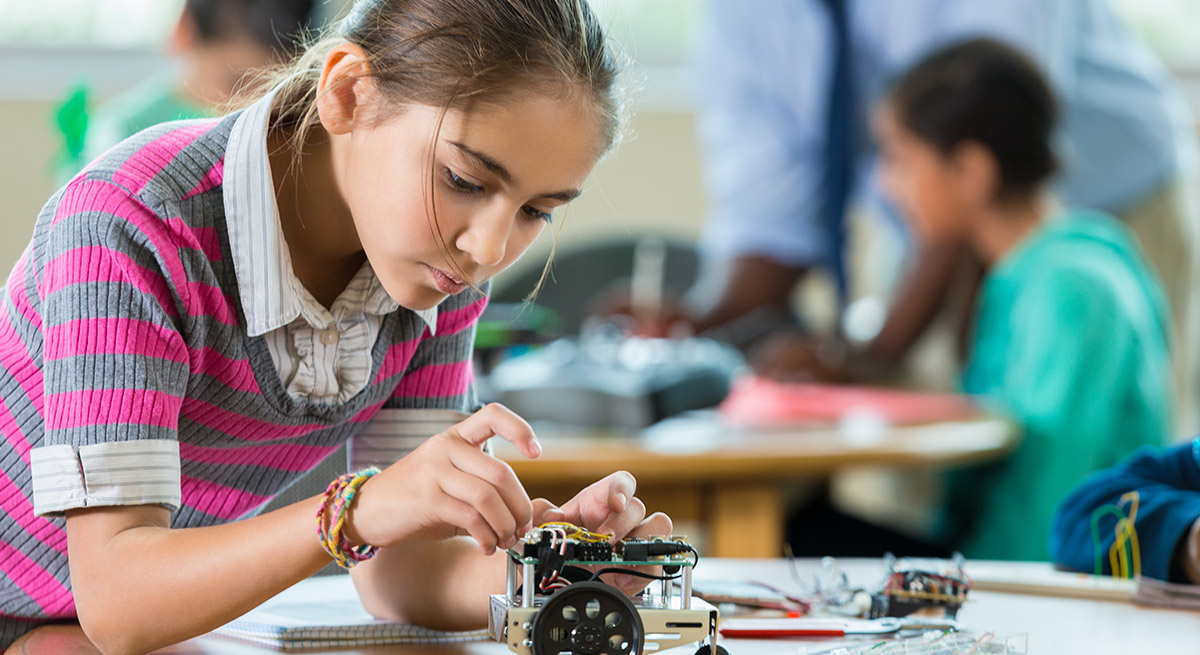
However, recent research from the National Center for Science and Engineering Statistics and Pew Research Center shows that Hispanic workers only represent about 15 percent of the total STEM workforce, and Hispanic students remain underrepresented in STEM degree programs, relative to all college graduates.
As local educational agencies continue to adopt and expand programming aimed at preparing all students for in-demand careers, Pomona Unified School District (PUSD) — which serves a student body where 93.3 percent of young people identify as Hispanic or Latino and about 96 percent qualify for free- or reduced-price lunches — has placed an emphasis on STEM opportunities, and students are reaping the benefits.
For instance, in 2022, the Garey High School InvenTeam was awarded U.S. Patent for their invention, Heart and Sole — a non-invasive device that allows individuals with diabetes to self-monitor foot health utilizing four sensors that measure variables relevant to the diabetic foot: oxygen saturation, blood flow, MEG and nerve conduction velocity.
The team of eight students — comprising seven girls and one boy, a quarter of whom were the first in their family to complete high schooland the majority of whom are Hispanic and were considered socioeconomically disadvantaged — was tasked with solving a real-world problem that could benefit their families and community.
And of those from the 2018 cohort who were awarded the patent, “They are all college graduates and some are already working at prestigious companies and others impacting communities with their own ideas as educators and scientists,” he continued.
During his 21 years at Garey High School, Gamboa said he watched as a handful of students entering STEM careers turned to hundreds. “When I say ‘hundreds,’ I am not exaggerating,” he said. “Their GHS experience in science was simply transformational. There are medical doctors, lawyers, Ph.D. scientists, mathematicians and engineers all with names and stories to be told from the same GHS program that evolved over 21 years of work.”
PUSD Superintendent Darren Knowles noted that the district’s STEM programming has helped students to develop their confidence and see how their knowledge is applied beyond the classroom and where it can take them. He said that he’s often seen former students return to give back to the school community.
According to Gamboa, “Many came back to speak with students, many mentored their brothers and sisters. Others reached out and donated equipment and other materials. Many came to speak with students to motivate them to attend college. Others became teachers and some came back to teach in Pomona.”
CSBA Delegate and PUSD trustee Dr. Roberta Perlman said the district’s medical program partnerships have been a major factor in providing an onramp to in-demand fields for students, and even provides an opportunity for families to get involved.
In collaboration with Western University of Health Sciences, PUSD students can explore careers in optometry, dentistry, veterinary medicine and more. One Saturday each month, students across the TK-12 district can put on their white coats and shadow students at the university while their parents learn more about their children’s potential college and career options.
These types of programs have had some kind of impact on everyone who has participated, including Perlman herself. Now in her 15th year on the board, she recalled one student who, through the Western University partnership, expressed a desire to go into optometry — Perlman’s field outside of her work on the school board. She is also an assistant professor at the university.
“I talk to her afterward and I go, ‘Well, why don’t you come shadow me?’ We developed this amazing relationship,” Perlman said.
The student attended Pitzer College in Claremont on a full-ride scholarship and ultimately received her graduate degree from Western University.
“She scribed for me through her whole undergrad and graduate career. And she knew so much by the time she got to optometry school, she could have taught them, because when you scribe, you learn a lot about the profession,” Perlman said. “She just finished her residency and she’s out working now.”